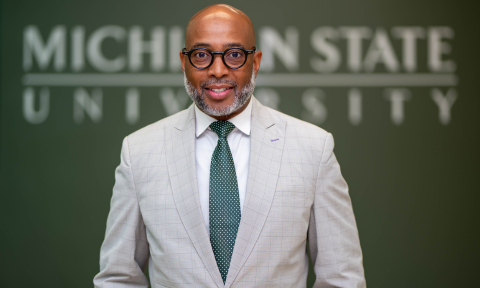These courses are typically offered in the semesters specified. For an up-to-date schedule of course offerings, please see the MSU Office of Registrar website.
Course Descriptions
Fall semester
3 credits
Course topics: Methods and techniques associated with the design of strength and conditioning programs to enhance performance in sport and fitness.
Past instructors: Nicholas Mortensen, PhD, Mike Vorkapich, MS, Master Strength and Conditioning Coach (CSCCa)
Spring semester
3 credits
Course topics: This course expands on KIN 815. Participants use evidence-based literature to support proper needs analysis, program design, and evaluations for team sports, individual sports, specific skill sports, and activities, including public health interventions, for both competitive and non-competitive populations.
Past instructors: Nicholas Mortensen, PhD
Spring semester
3 credits
Course topics: This course explores the science of nutrition and the roles it plays in health, athletic performance, recovery, and weight management. In-depth examinations using scientific principles and the latest research findings will be placed on the roles of macronutrients, micronutrients, hydration strategies, supplements, short-and long-term adaptations, and eating disorders.
Past instructors: Nicholas Mortensen, PhD
Summer semester
3 credits
Course topics: Emergency action planning; managing the health and safety of sport participants; prevention, care, and management of injuries; concussion knowledge and awareness
Past instructors: Jessica Wallace, Ph.D., ATC (University of Alabama) (2016-present)
Summer semester (new course for 2021)
3 credits
Course topics: Intersections between broader social issues and sport. Institutional structures, social interactions, and cultural norms/values of sport. Social context and the interplay between sport and social issues. Critical examination of sport and professional practice.
Past instructors: Andy Driska, PhD
Spring semester
3 credits
Course topics: Theories of management and organizational behavior in a sport context. Practical strategies and methods for management, development, and advancement of sport professionals, athletes, and stakeholders. Principles of diversity and equity and inclusive leadership.
Past instructors: Sanghoon Kim, PhD (2023-present), Jeffrey MacCharles, PhD (2021); Andy Driska, PhD (2020)
Fall semester
3 credits
Course topics: Organizational Behavior: What and Why, Managing Groups (Stress, Wellbeing, Socialization, and Integration), Managing Groups (Decision Making and Effective Teamwork), Managing Organizations (Communication, Organizational Change)
Past instructors: Sangchul Park, PhD
Special topics courses are determined 6-12 months in advance and are offered when warranted. A description of the course topic and description will appear in the MSU schedule. Announcements of special topics are made through our program blog, email, and social media.
A student may count a maximum of 9 credits of Special Topics courses towards their academic program plan.
Past Special Topics Courses
- Summer 2020 – Social and International Perspectives on Sport Coaching and Leadership (Jennifer Roth, PhD, with Jill Kochanek and Pelle Kvalsund)
- Spring 2021 – Media, Communication, and Sport (Jeff MacCharles, PhD)
Spring semester
3 credits
Course topics: Introduction to Sport Finance & Financial Management, Finance Basics (Time Value of Money, Risk), Budgeting/Financial Statements, Debt/Equity Financing, and Applications (Valuation and Economic Impact Analysis).
Past Instructors: Sangchul Park, PhD
Summer semester
3 credits
Course topics: Fundamental business aspects of the sport industry. Principles of marketing, communications, economics, budgeting and finance applied to sport. Principles and methods of revenue generation, management of expenditures through controlling and budgeting. Economic perspectives and theory in relation to sport entities and facilities.
Past Instructors: Sanghoon Kim, PhD (2023-Present), Jeff MacCharles, PhD (2022)
Spring semester, Summer semester
1 credit
Course topics: Ethical decision-making processes and moral obligations of the sport coach and leaders.
Past instructors: Andy Driska, PhD, Jennifer Roth, PhD
Fall semester
3 credits
Course topics: Governance structures and organization processes of professional, collegiate, scholastic, and amateur sport. Managerial and administrative governance activities. Structure and function of sport organizations. Policy issues and ethical questions.
Instructors: Sanghoon Kim, PhD (2022-Present), Jeff MacCharles, PhD (2021)
Spring semester
3 credits
Course topics: General legal concepts, federal and state legislation, legal liabilities, duty of care for sport coaches and administrators. Legal issues in amateur sport, safety of sport participants and spectators, injury prevention and management.
Past instructors: Alex Breske, Compliance Coordinator for MSU Athletic Department (2019-present)
Fall semester
3 credits
Course topics: Athlete motivation, motivational climates, and the social psychology of coaching and leadership. Instruction and reinforcement. Communication skills and leadership behaviors. Athlete mental health. Mental skills that enhance an athlete’s performance, including goal setting, self-talk, imagery, stress and arousal management, and attention management. Projects in motivational interviewing and imagery training.
Past instructors: Andy Driska, PhD
Spring semester
3 credits
Course topics: Athlete motivation, motivational climates, and the social psychology of coaching and leadership. Instruction and reinforcement. Communication skills and leadership behaviors. Athlete mental health. Mental skills that enhance an athlete’s performance, including goal setting, self-talk, imagery, stress and arousal management, and attention management. Projects in motivational interviewing and imagery training.
Past instructors: Jennifer Roth, PhD
Summer semester
3 credits
Course topics: Principles of anatomy, biomechanics, and physiology for coaching amateur athletes in various sports. Relationships between the biological bases of coaching and physical conditioning, and performance enhancement.
Past instructors: Tony Moreno, PhD (Eastern Michigan University) (2017-present)
Fall semester
3 credits
Course topics: Positive youth development through sport research. Models for fostering positive youth development through sport. Life skills through sport programs. Characteristics of effective youth coaches. Coaches as natural mentors. Youth sport coaching skills. The importance of program evaluation. Coaching coaches. Contemporary Issues.
Past instructors: Jennifer Roth, PhD
Spring semester
3 credits
Course topics: TBD
Past instructors: TBD
Fall semester (every other year)
3 credits
Course topics: **
Past instructors: Karin Pfeiffer, PhD
Spring semester
3 credits
Course topics: Athletic development in childhood, adolescence, and young adulthood; Long-term athlete development model; Physical literacy; Impact of biological maturation on performance; Interpretation of developmental data; Impact of growth on performance; Applications in coaching and program management.
Past instructors: Jennifer Roth, PhD (2019, Present); Robert Gibbs, PhD (2020); Andy Driska, PhD (2017-2018)
Spring semester
3 credits
Course topics: Motor learning principles applied to sport coaching. Constraints-led approaches to coaching. Individual, environmental, and task constraints. Methods of skill instruction. Use of video to review, reflect upon, and improve coaching practices.
Past instructors: Andy Driska, PhD
Fall semester
3 credits
Course topics: Science of sport coaching, leadership, and administration. Professional and reflective learning strategies. Coaching and leadership philosophy. Scientific literacy, evidence-based practices, research translation, and applied inquiry. Research ethics training.
Past instructors: Sanghoon Kim, PhD (2024-Present), Andy Driska, PhD (2016-2021); Jennifer Roth, PhD (2019-2021)
Fall semester
3 credits
Course topics: How to approach and evaluate the claims of products and services within the health and wellness industry by independently judging the effectiveness of the claims presented. Practice healthy skepticism, analyze the results and limitations of research studies, and apply critical thinking skills in practical environments.
Past instructors: Nicholas Mortensen, PhD
Spring semester
3 credits
Course topics: Sport Analytics: What, Who, and Why, Basic Functions/Analysis Techniques, Basic Data Mining and Graphing, Data Visualization, Advanced Data Visualization, Storytelling with Data
Past instructors: Sanghoon Kim, PhD, Sangchul Park, PhD
Summer semester, Fall semester
3 credits
Course topics: Apply foundational knowledge from KIN 875A to real-world data and projects. Develop and execute a sport analytics project from conception to conclusion. Utilize analytical tools and software to gather, analyze, and interpret sports-related data. Enhance problem-solving, critical thinking, and project management skills within the context of sport analytics. Present project findings in a clear and professional manner, both in written reports and oral presentations. Gain practical experience in working with sports data, preparing students for careers in sport analytics or related fields.
Past instructors: Bill Burghardt, PhD
Fall semester, Spring semester
3 credits
Course topics: Supervised practical experiences in specific sport or leadership programs. Video review and peer review of field experiences. Structured reflection on implementation and effectiveness. Planning and evaluation. Action plans.
Past instructors: Andy Driska, PhD (2017-2020), Jennifer Roth, PhD (2019-Present), Mary-Anne Reid, M.Ed. (2017-2020)
Any semester as arranged with and approved by a faculty member
3 credits
Please note: this course is not typically offered. In rare circumstances where the student can propose a topic and find a faculty mentor for the independent study, this course may be used for elective credit in the student’s program plan. This arrangement should be discussed with the MS degree program coordinator in addition to the student’s advisor; it also requires a student-initiated application form. An independent study may be appropriate for a student with a unique topical interest and might consist of conducting an extensive literature review on that topic.
Course topics: Complete an independent study as planned and arranged with the supervision of a faculty member in the Department of Kinesiology.
Fall semester, Spring semester, Summer semester
3 credits
Course topics: Supervised internship experience in a sport administration position. The student and advisor work together to arrange for the internship experience, which is completed towards the end of the student’s academic program plan. Enrollment in the course requires advisor and department approval with a student-initiated internship form.
Instructor: Sangchul Park, PhD (2025-Present), Sanghoon Kim, PhD (2022-Present), Richard McNeil, PhD (2024-Present)
Fall semester, Spring semester, Summer semester
2 credits
Students enroll in this course in their final semester of the MS degree program. The student should work with their advisor before the final semester to determine their plan for the capstone, either a novel project or a portfolio. Department approval, granted by the student’s advisor, is required to enroll in this course. Students may propose a capstone project before enrolling in this course on permission of the advisor.
Course topics: This is an independent capstone experience in which the student creates a product: either a novel product (such as a study, a set of learning materials, a manuscript for publication) or a portfolio that synthesizes and integrates their learning experiences relative to the program competencies. The student forms a committee (the advisor plus one other member) and completes a proposal meeting that consists of an oral examination and a presentation of their capstone product. After revising the product according the committee’s guidance, the student completes a defense meeting. After a successful defense meeting, the degree can be conferred.
Past instructors: Sanghoon Kim, PhD (2023-Present), Andy Driska, PhD (2017-2021), Jennifer Roth, PhD (2019-2021)




